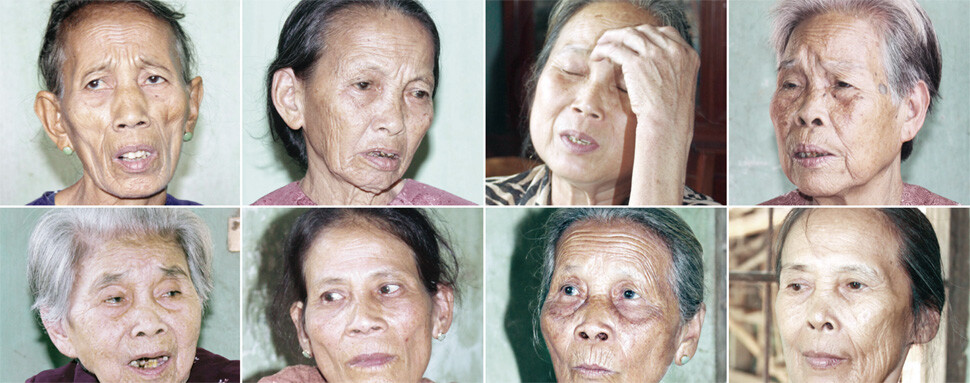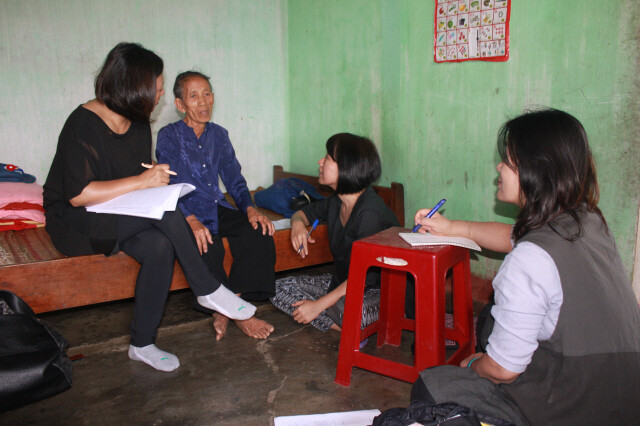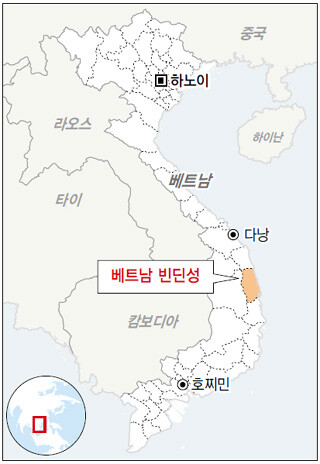hankyoreh
Links to other country sites 다른 나라 사이트 링크
Vietnamese war victims speak of sexual violence by S. Korean troops for the first time

The old women reached into their memories. Slowly, haltingly, they began to speak. Some had been hiding it all their lives and were only talking about it now. Just as South Korea’s comfort women survivors waited until their old age before coming forward about their experiences as sexual slaves to the Japanese military - the first of them, Kim Hak-soon (1924-97), related hers on Aug. 14, 1991 - so these survivors of sexual assault during the Vietnam War were giving their first, difficult account of their experiences only now, as elderly women.
“Four people took turns doing it to me one at a time.”
“They’d put one person at a time in the trench, keep me there all day and night and just rape me again and again.”
These were the stories shared by survivors of sexual assault by South Korean troops in the province of Binh Dinh in central Vietnam.
“It was terrifying. It was so brutal. I’m still scared of you Koreans today.”
“Dai Han [Korean]? My goodness, I didn’t know. You? If I’d known you were Koreans, I wouldn’t have met with you.”

The visitors from the Korean Council for the Women Drafted for Military Sexual Slavery by Japan had gone to Vietnam specifically to meet women who had been sexually assaulted by South Korean troops during the Vietnam War. Yet even they were seen as “Dai Han” (Koreans) to be feared and shunned - the same “Dai Han” remembered as symbols of terror and brutality.
Yoon Mi-hyang, the council’s president, arrived for a five-day visit on Mar. 16 to meet with ten survivors aged 61 to 86 and hear their accounts of being sexually assaulted by South Korean troops in various locations in Binh Dinh Province during the Vietnam War, including the city (formerly district) of An Nhon and the districts of Tuy Phuoc and Phu Cat. It was part of the “Butterfly Fund,” a project by the council - which has mainly worked for a resolution on the Japanese military comfort women issue - to help wartime sexual assault survivors in other countries as well. Vietnam was the second country in the program, after Congo.

The Hankyoreh is now sharing accounts from the elderly survivors interviewed by Yoon, representing over one-third the 26 sexual assault survivors officially confirmed by the Binh Dinh People’s Committee. This marks the first time they have shared their names and faces and revealed specifics about the situation at the time.
April 30 marks the 40th anniversary of the Vietnam War’s end. It is also 50 years since the South Korean military first sent combat troops to Vietnam. They are years the victims have spent nursing deep wounds and bitterness. Officially, the Vietnamese government advocates “putting the past behind and moving forward to the future.” But the women’s grievances are anything but behind them. The trauma lives on. Ignoring the signals from their own government, they have insisted on an investigation, an apology, and compensation from South Korea.
“I can’t think of anything I can say to all of you. We were innocent victims too, but hearing now that Vietnamese women were victimized by us Koreans, we feel mortified and sorry as Koreans. That is why we intend to combine our strength and raise the Butterfly Fund to provide some small help to the victims.”
It was on Mar. 7, 2014, the second anniversary of the council’s establishment of the fund to help wartime sexual assault victims and prevent future victimization, that Kim Bok-dong and Gil Won-ok, two survivors of sexual slavery by the Japanese military, first delivered this message of responsibility and solidarity as South Korean citizens to the Vietnamese women.
The council issued its own statement calling for the South Korean government and public to “assume shared responsibility for the suffering that fills the bodies and minds of each and every one of the Vietnamese people.” In particular, it demanded that Seoul acknowledge and investigate South Korea’s war crimes, apologize formally to the Vietnamese government and public, and assume legal responsibility.
An Nhon, Tuy Phuoc, and Phu Cat in Binh Dinh province were sites where the South Korean military’s Capital Mechanized Infantry Tiger Division command and first regiment were stationed between Oct. 1965 and Feb. 1973. While there, the division carried out a total of 167 operations and combat engagements in the provinces of Binh Dinh and Phu Yen, including the three areas.
“Some of the units didn’t cause any problems because they were strictly instructed not to do harm to civilians,” recalled 67-year-old Kim Nak-yeong, who worked as a staff sergeant for the eighth company of the division’s armored regiment in Binh Khe, Binh Dinh, between May 1971 and June 1972. “But I heard a lot of talk about brutal sexual assaults taking place throughout the operation zones, and my understanding is there’s a definite possibility it was true.”
Official statistics for the South Korean command in Vietnam indicate 21 trials and disciplinary actions for rape for the entire South Korean military between 1965 and 1972. (“The Vietnam War and South Korean Military in Statistics,” Ministry of National Defense Institute for Military History, 2007)
The Korean Council and their Butterfly FundThe Korean Council for the Women Drafted for Military Sexual Slavery by Japan was established on Nov. 16, 1990, by 37 progressive women’s groups in order to address the issue of the comfort women, or sex slaves for the imperial Japanese army.
With the goal of “restoring the reputation of women forced to work as sex slaves for the Japanese imperial army and to prevent sexual abuse of women during wartime,” the council has been active both at home through education and memorial programs and overseas by working with the UN and other Asian countries attacked and occupied by Japan to provide aid to the victims.
In 1992, the council began holding demonstrations each Wednesday in front of the Japanese Embassy in Seoul. These demonstrations have continued for 22 years, with the 1,173rd one taking place on April 8th of this year. In 2012, the council built the War and Women's Human Rights Museum with money donated by private individuals over nine years.
On Mar. 8, 2012, International Women’s Day, the council established the Butterfly Fund to provide solidarity and support to the victims of sexual violence in wartime. In 2012, the fund began to support women raped in the Congo Civil War and the children born of those rapes, and in 2013 it began to support the victims of sexual violence in Vietnam. The butterfly symbolizes the hope that the former comfort women, as well as all women, will be released from discrimination, oppression, and violence, and be able to freely spread their wings.
By Koh Kyoung-tae, senior staff writer and Yoon Mi-hyang, President of The Korean Council for the Women Drafted for Military Sexual Slavery by Japan
Please direct questions or comments to [english@hani.co.kr]

Editorial・opinion
![[Column] Has Korea, too, crossed the Rubicon on China? [Column] Has Korea, too, crossed the Rubicon on China?](https://flexible.img.hani.co.kr/flexible/normal/500/300/imgdb/original/2024/0419/9317135153409185.jpg) [Column] Has Korea, too, crossed the Rubicon on China?
[Column] Has Korea, too, crossed the Rubicon on China?![[Correspondent’s column] In Japan’s alliance with US, echoes of its past alliances with UK [Correspondent’s column] In Japan’s alliance with US, echoes of its past alliances with UK](https://flexible.img.hani.co.kr/flexible/normal/500/300/imgdb/original/2024/0419/2317135166563519.jpg) [Correspondent’s column] In Japan’s alliance with US, echoes of its past alliances with UK
[Correspondent’s column] In Japan’s alliance with US, echoes of its past alliances with UK- [Editorial] Does Yoon think the Korean public is wrong?
- [Editorial] As it bolsters its alliance with US, Japan must be accountable for past
- [Guest essay] Amending the Constitution is Yoon’s key to leaving office in public’s good graces
- [Editorial] 10 years on, lessons of Sewol tragedy must never be forgotten
- [Column] A death blow to Korea’s prosecutor politics
- [Correspondent’s column] The US and the end of Japanese pacifism
- [Guest essay] How Korea turned its trainee doctors into monsters
- [Guest essay] As someone who helped forge Seoul-Moscow ties, their status today troubles me
Most viewed articles
- 1[Column] The clock is ticking for Korea’s first lady
- 2[Correspondent’s column] In Japan’s alliance with US, echoes of its past alliances with UK
- 3Samsung barricades office as unionized workers strike for better conditions
- 4After 2 months of delayed, denied medical care, Koreans worry worst may be yet to come
- 5[Column] Has Korea, too, crossed the Rubicon on China?
- 6[Editorial] When the choice is kids or career, Korea will never overcome birth rate woes
- 7Hong Se-hwa, voice for tolerance whose memoir of exile touched a chord, dies at 76
- 8US overtakes China as Korea’s top export market, prompting trade sanction jitters
- 9Constitutional Court rules to disband left-wing Unified Progressive Party
- 10Nearly 1 in 5 N. Korean defectors say they regret coming to S. Korea